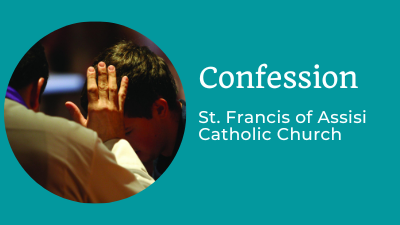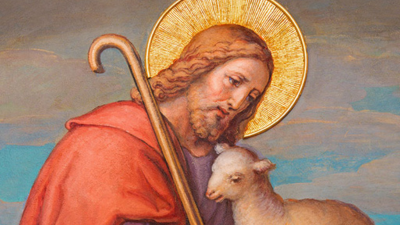Confession
“Jesus said to them again, ‘Peace be with you. As the Father has sent me, so I send you. And when he had said this, he breathed on them and said to them, “Receive the holy Spirit. Whose sins you forgive are forgiven them, and whose sins you retain are retained.” (John 20:21-23)

Sacrament of Reconciliation
Saturday – 4:00 pm
English and Spanish
also by appointment
Pardon by God’s Mercy
Also called “Reconciliation,” this is one of the two “Sacraments of Healing” celebrated by the church. The Sacrament of Anointing of the Sick is the other. “Those who approach the Sacrament obtain pardon by God’s mercy for the offense committed against Him, and are, at the same time, reconciled with the Church which they have wounded by their sins and which by charity, by example, and by prayer, labors for their conversion.” (Catechism of the Catholic Church)
Lenten Reconciliation
During the Season of Lent the Sacrament of Reconciliation is also available on Wednesday evenings at 7:00 pm as well as during a Lenten Penance Service. Check the parish bulletin for precise time and dates.
Examinations of Conscience

Adult Examination of Conscience

Middle Schooler Examination of Conscience

Child Examination of Conscience

Examination: 7 Deadly Sins
Why go to Confession?
A pastoral letter on Reconciliation – Together, let us try to understand what Confession is: If you really understand it, with your mind and heart, you will feel the need and the joy of experiencing this encounter, in which God, granting you his forgiveness through the ministry of the Church, creates a new heart in you, puts a new Spirit in you, so that you can live a life reconciled with Him, with yourself and with others, so that you also will be able to forgive and love, beyond any temptation to mistrust and weariness. Read more…
Reasons we avoid Confession
We may be afraid of looking foolish because we haven’t been to confession in a long time. We’re uncertain about what to confess. We are embarrassed to mention our sins. We are ashamed to keep confessing the same sins. We are afraid we will shock the priest. The confessor is a priest we know well. The reasons are many, all of them real to the penitent. But what awaits you in the sacraments is the all embracing love and mercy of God. Read more…
Forgiveness in Four Easy Steps
In every relationship, there comes a time when something goes wrong and one person or one group offends the other, and the relationship is damaged. Whether a personal or a more structured relationship between an individual and a group or organization, some process of healing or repair is required to restore the relationship. Sometimes it takes as little as an apology—”I’m sorry”—but in some cases, a more significant act or gesture to demonstrate good will or an attempt to make up for the harmful action is required. Read more…
12 Reasons not to go to Confession
Some people look forward to going to Confession – others, not so much! Many just don’t think they need to go. Whatever group you find yourself in, we are pleased to offer you a dozen resons not to go to Confession: #1 Your natural tendency to love God in all things and to love your neighbor as yourself causes you to walk about an inch off the ground on an invisible cloud of holiness. Read more… (clearly this will be a humerous list…)
Confession: Frequently Asked Questions
These are some of the most common questions we are asked about Confession. Let us know if you have more questions … who knows, we might add them to this list!!
blank
Intentionally blank and positioned at top so that all the dropdowns are closed upon opening
Why do I have to confess my sins to a priest?
That’s the way Jesus set it up on Easter Sunday evening. He told his apostles that just as God the Father had sent him — and God the Father sent him to save us from our sins — so he was sending them.
He breathed on them the power of the Holy Spirit, giving them God’s power to forgive sins, since no one can forgive sins but God alone. He told them that whatever sins they forgive are forgiven and whatever sins they retain are retained (Jn 20:21-23; Mk 2:7).
Since the apostles were unable to read minds, the only way that they would know which to forgive and which to retain is if people told them their sins. Jesus thus established the essential structure of the sacrament of confession.
Just as he uses priests to give us his Body and Blood at Mass so he uses them to give us His mercy in Penance.
What do I need to do to make a good confession?
The sacrament consists of three actions on the part of the penitent:
- contrition, which is sorrow for one’s sins;
- confession, that is examining one’s conscience and telling one’s sins to the priest;
- penance, namely a desire to make up for one’s sins and amend one’s life.
Together the three are called the “acts of the penitent.”
What does it mean to “examine my conscience” ?
One does so by asking for God’s help and prayerfully examining one’s actions in the light of Christ’s teaching and example.
Some review their behavior by the Ten Commandments, others by Christ’s command to love God and love others, others by their correspondence to the beatitudes, others by comparing their behavior to the most important Christian virtues, and others by the seven “capital” sins (pride, envy, anger, sloth, greed, lust and gluttony).
It is not enough merely to focus on how one’s broken God’s “rules,” but rather how one has damaged his relationship with God and others and hurt himself interiorly. It is also important to examine for sins of omission.
I know mortal sins must be confessed, but should I also confess the venial sins I’m aware of?
The Church strongly recommends that we confess our every day faults (venial sins) because it can help us “to form our conscience, fight against evil tendencies (patterns of weakness that can lead us to sin), … be healed by Christ and progress in the life of the Spirit. (CCC 1458; CIC 988). Confession of our venial sins shows our repulsion of all sin because even venial sins are against the love of God and neighbor.
Should I go to confession if I’m only aware of having committed venial sins?
Yes. We should not stay away from confession if we’ve committed only venial sins, since the sacrament not only forgives our sins but gives us God’s grace to fight against temptation. The great saints, who were filled with love of God and seem for the most part to have avoided mortal sins, have confessed very frequently, because the sacrament helps us to grow in God’s grace. It reveals to us our need for God’s help in the “little things” of the day and leads us to ask for that help.
Should I go to confession if I haven’t committed any sins since my last confession?
No, you should stay at home and wait for your canonization papers to arrive! 🙂 Seriously, if it’s been a long time since your last confession, maybe you can examined your conscience more carefully. “The just man,” the Book of Proverbs tells us, “falls seven times a day” (Prov 24:16).
How often do I need to confess?
Myth: you can’t receive the Holy Eucharist if you did not go to Confession in that same week.
Fact: If you are aware of mortal sin, do not receive the Eucharist, rather seek out a priest for confession.
Strictly speaking, after they’ve reached the age of reason, Catholics are obliged to confess their serious sins at least once a year (CIC 989), but the minimum should not be made a maximum.
Catholics should come to confession as soon as possible after they’ve committed a mortal sin. If they’re seeking to grow in holiness, the regular practice of confession at least once a month is commended.
Should one come weekly? No one answer fits all situations. Priests worry about and have compassion for people that are overly scrupulous about sin and it is only a matter of days between confessions. Often it is accompanied by a written list of venial sins that are probably the same as their previous confession.
Can a priest reveal what he has heard to others?
No. A priest can never reveal the sins a person has confessed. This is known as the “Seal of confession,” which admits of no exceptions (CCC 1467). If a priest were to violate the seal of confession he would be automatically excommunicated (CIC 1388).
Over the centuries several priests have died and many have been imprisoned because they refused, even under threat of torture and execution, to break the inviolable seal of confession.
This is one of the most beautiful aspects of the sacrament and of the priesthood: the priest who hears our confession, in order to protect the secrets we have whispered to God through him, will allow himself to be imprisoned, tortured or even killed. That’s how seriously he and the Church take the seal and the sacrament.
What is the priest’s role in the sacrament of confession?
“When he celebrates the sacrament of Penance, the priest is fulfilling the ministry of the Good Shepherd who seeks the lost sheep, of the Good Samaritan who binds up wounds, of the Father who awaits the prodigal son and welcomes him on his return, and of the just and impartial judge whose judgment is both just and merciful.”
“The priest is the sign and the instrument of God’s merciful love for the sinner.”
The priest is called, practically, to lead “the penitent with patience toward healing and full maturity. He must pray and do penance for his penitent, entrusting him to the Lord’s mercy” (CCC 1465-66).
Sin: Frequently Asked Questions
These are some of the most common questions we are asked about Confession. Let us know if you have more questions … who knows, we might add them to this list!!
blank
Intentionally blank and positioned at top so that all the dropdowns are closed upon opening
What is sin and what sins need to be confessed in the Sacrament of Penance?
Sin is an offense against God that ruptures our communion with Him and with His Church (CCC 1440). It is far more than “breaking the rules,” but is a failure to love God and to love others, which causes real damage in all our relationships.
There are sins totally incompatible with love for God and others (mortal sins, in which genuine love is “dead”), and ones in which love is less grievously wounded (venial or “easily forgiven”). The Church says that all grave or mortal sins must be confessed as soon as possible (CIC 988).
What is a mortal sin?
A mortal sin involves an action whose object is grave matter that is committed with full knowledge and deliberate consent.
- Full knowledge means that one is aware that God or the Church he founded considers the act sinful (even if one doesn’t totally understand why it is sinful).
- Deliberate consent means a consent sufficiently intentional to be a personal choice (CCC 1857-1859).
This means that mortal sins cannot be done “accidentally.” A person who commits a mortal sin is one who knows that their sin is wrong, but still deliberately commits the sin anyway. This means that mortal sins are “premeditated” by the sinner and thus are truly a rejection of God’s law and love.
What are the consequences of a mortal sin?
A mortal sin “results in the loss of charity and the privation of sanctifying grace, that is, of the state of grace. If it is not redeemed by repentance and God’s forgiveness, it causes exclusion from Christ’s kingdom and the eternal death of hell, for our freedom has the power to make choices for ever, with no turning back” (CCC 1861). This is why it is so important for mortal sins to be confessed to a priest as soon as possible.
What is a venial sin and what are its consequences?
“One commits venial sin when, in a less serious matter, he does not observe the standard prescribed by the moral law, or when he disobeys the moral law in a grave manner, but without full knowledge or without complete consent. Venial sin weakens charity; it manifests a disordered affection for created goods; it impedes the soul’s progress in the exercise of the virtues and the practice of the moral good; it merits temporal punishment. Deliberate and unrepented venial sin disposes us little by little to commit more serious sin. However venial sin does not set us in direct opposition to the will and friendship of God; it does not break the covenant with God. With God’s grace it is humanly reparable” (CCC 1862-1863)
Can ordinary/venial sins be forgiven in the absence of the Sacrament of Confession?
There are ordinary means for receiving forgiveness of venial sins outside of confession. These include: attending Mass and worthily receiving Communion; doing acts of charity; fasting; and almsgiving. But there is a condition attached. The Catechism in No. 1452 says, “When it arises from a love by which God is loved above all else, contrition is called ‘perfect.’ Such contrition remits venial sins.
Examine your conscience, consider if your sorrow is rooted in perfect contrition, if so, bring the sin and the intention to sin no more to a celebration of Mass and be assured of God’s forgiveness.
Caution: there is an old expression: “He who acts as his own doctor has a fool for a patient.” There is wisdom in that. Check in with the “spiritual doctor”, the priest, and continue a regular practice of celebrating the Sacrament – perhaps less often, but make it part of your spiritual practice.
What If I Withheld a Sin in Confession?
A clarification is in order. “Withholding any information” doesn’t invalidate a confession. We aren’t required, for instance, to mention every venial sin. The Catechism in No. 1458 says, “Without being strictly necessary, confession of everyday faults (venial sins) is nevertheless strongly recommended by the Church. Indeed the regular confession of our venial sins helps us form our conscience, fight against evil tendencies, let ourselves be healed by Christ and progress in the life of the Spirit.”
For a confession to be valid, we do, however, have to confess all the serious sins that we might have committed since the previous confession, plus any serious sins from the past that we might have forgotten to mention. To deliberately withhold mentioning a mortal sin makes a confession invalid.
What is the meaning of perfect and imperfect contrition?
There are two types of contrition: sorrow over hurting one we love (called perfect contrition) and sorrow over getting caught or over the punishment that comes because of sin (imperfect contrition).
We should ask God to help us achieve that perfect contrition in which we are sorry for having wounded the God who loves us and whom we should love in return.
Meditation on the consequence of our sins and the price Jesus paid for our redemption often helps us to grow toward perfect contrition.
If I forget to confess a mortal sin, is my confession still valid and my sins forgiven?
If one through bad memory or nervousness forgets to confess a mortal sin, the person’s confession is valid and all his or her sins will be forgiven.
The person should, however, mention that forgotten sin in the next confession to receive advice and a proper penance. If this is a routine occurrence, it is probably an indication that one is either confessing too infrequently or not fully aware of the true consequences of mortal sin, because one should not forget mortal sins easily.
If, on the other hand, a penitent deliberately refuses to mention a mortal sin in confession, none of the person’s sins will be forgiven, and the person will remain in the dangerous state of mortal sin.
Other Frequently Asked Questions
These are some other commonly asked questions about Confession. Let us know if you have more questions … who knows, we might add them to this list!!
blank
Intentionally blank and positioned at top so that all the dropdowns are closed upon opening
What if I feel nervous about going to the sacrament?
Remember, first, that in the sacrament you are fundamentally talking to God through the priest. God loves you, wishes to forgive you, and desires to embrace you with the joy with which the prodigal son was embraced in Jesus’ parable (Lk 15:11-32).
Moreover, know that you will not say anything that the priest has not heard before. Do not be afraid. If you are nervous, please just tell the priest that you’re nervous and he will help you.
What if I haven’t been to the sacrament for many years? How do I prepare? What do I say?
- First, don’t be afraid. Jesus said, “Heaven rejoices more for one repentant sinner than for 99 righteous persons who never needed to repent.” The priest will probably be so happy you’ve returned to confession after many years that you will make all the hours he spends in the confessional seem light.
- Second, try to prepare with the help of a good examination of conscience sheet, but the priest will know that you cannot remember your sins with the precision of someone who came the previous week.
- Third, get the largest sins off of your shoulders first.
- Fourth, don’t be afraid to ask the priest for help; most confessors are experts in leading someone in your circumstances through an examination of the “big stuff” in the confessional.
- Finally, don’t wait. Come back to be reconciled to your loving Father, set off the celebration in heaven, and share your Father’s joy!
I’m reluctant to go to confession because I don’t know the Act of Contrition by heart.
Confession is not meant to be a memory test. It is good when Catholics have memorized one of the many beautiful acts of contrition, which sum up all of the sentiments and resolutions a Catholic should have in coming to confession.
But if you do not know an Act of Contrition by memory, you can always express your sorrow and firm purpose of amendment in your own words, ask the priest to help you, or pray, “Jesus, Son of God, have mercy on me, a sinner who loves you!”
Act of Contrition:
God, I am heartily sorry for having offended you, and I detest all my sins because I dread the loss of heaven and the pains of hell; but most of all because they offend you, my God, who are all good and deserving of all my love. I firmly resolve with the help of your grace to confess my sins, do penance, and to amend my life. Amen.
What if I prefer to go to confession to priests at nearby parishes or at Catholic shrines or chapels where confessions are available each day?
The most important thing is that you go! You can go to any Catholic priest in good standing with the faculties to hear confessions. You may find over time, however, that you will be helped more in your struggle against sin by a good confessor who has gotten to know you than by confessing to various priests, none of whom really know you.
Can I confess my sins over the telephone or via the internet?
You can confess your sins in any number of ways — many have confessed to bartenders and hairdressers over the centuries — but you cannot receive sacramental absolution via the internet or on the phone.
Do I have to go to Confession before receiving Holy Communion like everyone did years ago when I was a child?
If you are conscious of having committed a mortal sin, then, yes, you must first go to receive Jesus’ forgiveness in the Sacrament of Penance and be restored by Him to loving communion before you can come to receive Him in Holy Communion.
The reason why young children must receive the Sacrament of Penance before first Holy Communion is to ensure that they have cleaned their inner “temples” to receive the greatest Guest of all.
The same principle applies to all of us. If one has not committed any serious sins since his or her last good confession, then it is not necessary to confess before receiving the Holy Eucharist.
May I receive the Eucharist if I’m divorced?
If you are civilly divorced but have not remarried or were validly married in the Church after receiving a declaration of nullity for your first marriage, then, yes, you may receive the Sacrament of the Eucharist and participate in the Sacrament of Confession.
If you have remarried outside of the Church or have entered into a cohabitating relationship, then those predicaments must be addressed before you can receive absolution.
If you’re in these circumstances, you are encouraged to talk to a priest in the light of God about your present situation and possibly begin an investigation of whether your first marriage was valid.
I’ve heard that in some places people receive “general absolution” all at once, without needing to go individually to a priest. Is this valid?
The Church teaches, “In case of grave necessity recourse may be had to a communal celebration of reconciliation with general confession and general absolution.” Grave necessity of this sort can arise when there is imminent danger of death without sufficient time for the priest or priests to hear each penitent’s confession. For practical purposes, outside of a threat of imminent danger of death, the short answer is “no.”
Grave necessity can also exist when, given the number of penitents, there are not enough confessors to hear individual confessions properly in a reasonable time, so that the penitents through no fault of their own would be deprived of sacramental grace or Holy Communion for a long time. In this case, for the absolution to be valid the faithful must have the intention of individually confessing their sins in the time required. The diocesan bishop is the judge of whether or not the conditions required for general absolution exist. A large gathering of the faithful on the occasion of major feasts or pilgrimages does not constitute a case of grave necessity” (CCC 1483).
I haven’t been to confession in many years. How can I possibly remember every little sin to confess from then until now?
You don’t have to remember every single sin. The Holy Spirit will reveal to you the most important ones for you to confess. Start with the most serious ones first and then go on to all the ones you can remember. The grace of the sacrament will “cover” the sins you can’t recall at the moment; although it’s important to confess them later if you do remember. A general rule of thumb is that the ones that are hardest to talk about are the ones, once confessed, that will help you grow the most.
The thought of having to confess certain sins, out loud, to a priest, makes me extremely uncomfortable. Will the priest express disappointment or shock when he hears what I have to say?
You’re not going to shock or disappoint the priest. Every confession reveals something of the human condition, which the priest is very familiar with. He understands. Rather than feeling shock or disappointment, most priests feel great compassion and mercy. Your confessor won’t be disappointed with you. And remember, although you are confessing your sins to a priest you’re really confessing them to Jesus Christ.
Can I make a general confession of my life? It’s been a long time since my last confession.
Not to be confused with “general absolution”, usually, the term “general confession” refers to going to confession and confessing all the sins of one’s past life (or of an extended period, like the past year) instead of just those sins committed since one’s previous confession. Traditionally, making this kind of confession has been a recommended spiritual practice for moments of major life transition. Some retreat directors will also recommend making a general confession when retreatants participate in retreats.
The idea behind making a general confession is simple and profound. Remember, the sacrament of reconciliation is meant to be a significant encounter with God’s mercy. At particularly poignant moments in our faith journey, preparing a general confession gives us a good opportunity to prayerfully reflect on our whole life history, and on how faithful God has been to us throughout that history even when we weren’t so faithful to him. Going over our whole past, or a significant chunk of that past, together with the Lord, is meant to bring us to a new appreciation of our need for God, of the abundance of his mercy, and of the depth of his care for us.
Another benefit sometimes accrues to this devotional practice as well. When we patiently take time to review all the sins of our past life in the presence of God, the Holy Spirit will often enlighten us regarding not only individual falls, but regarding patterns of sin and underlying attitudes that make us vulnerable to temptation. These insights can serve as a valuable guide as we prudently identify a path of spiritual growth for the future. In other words, making a general confession can be an effective way to grow in self-knowledge, such an essential element for spiritual progress.